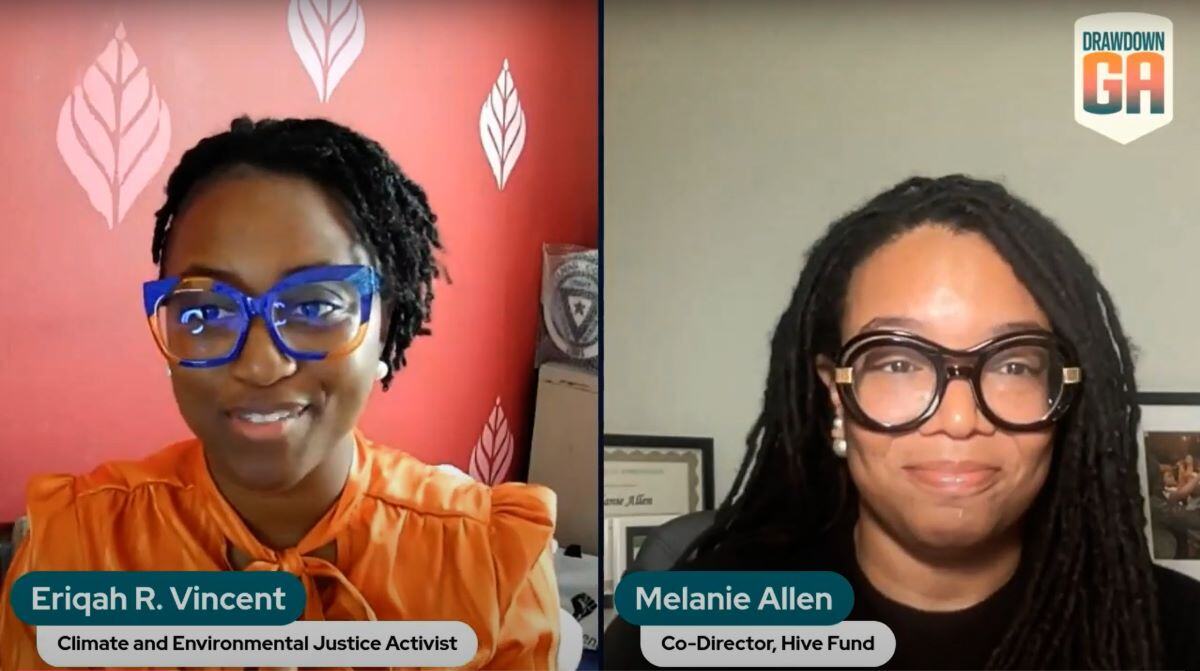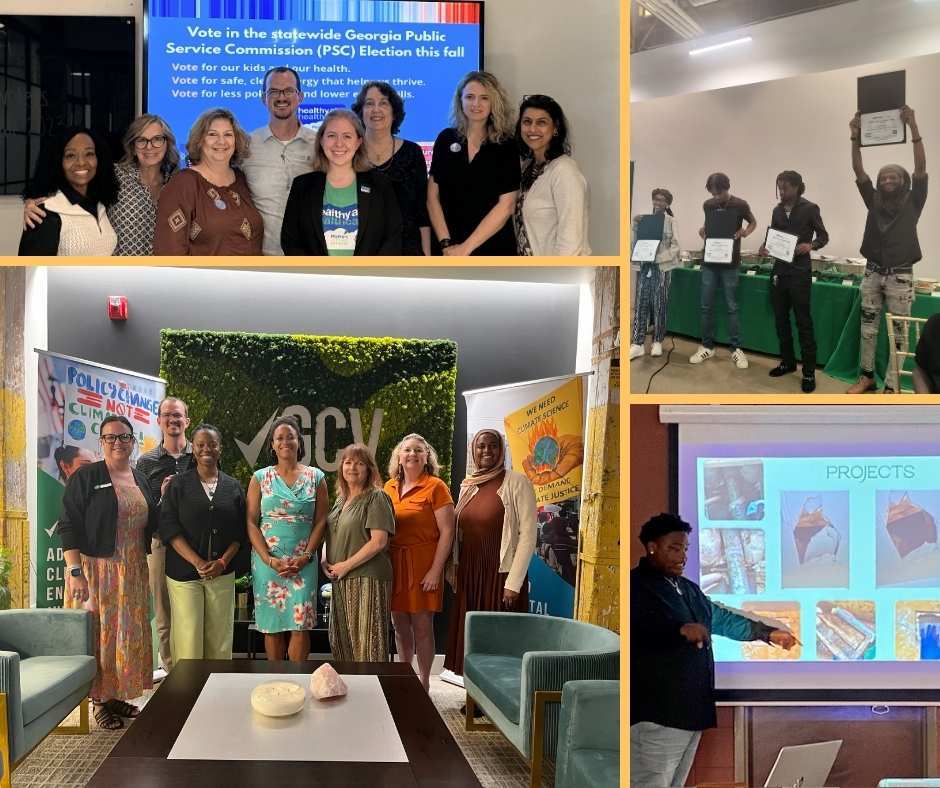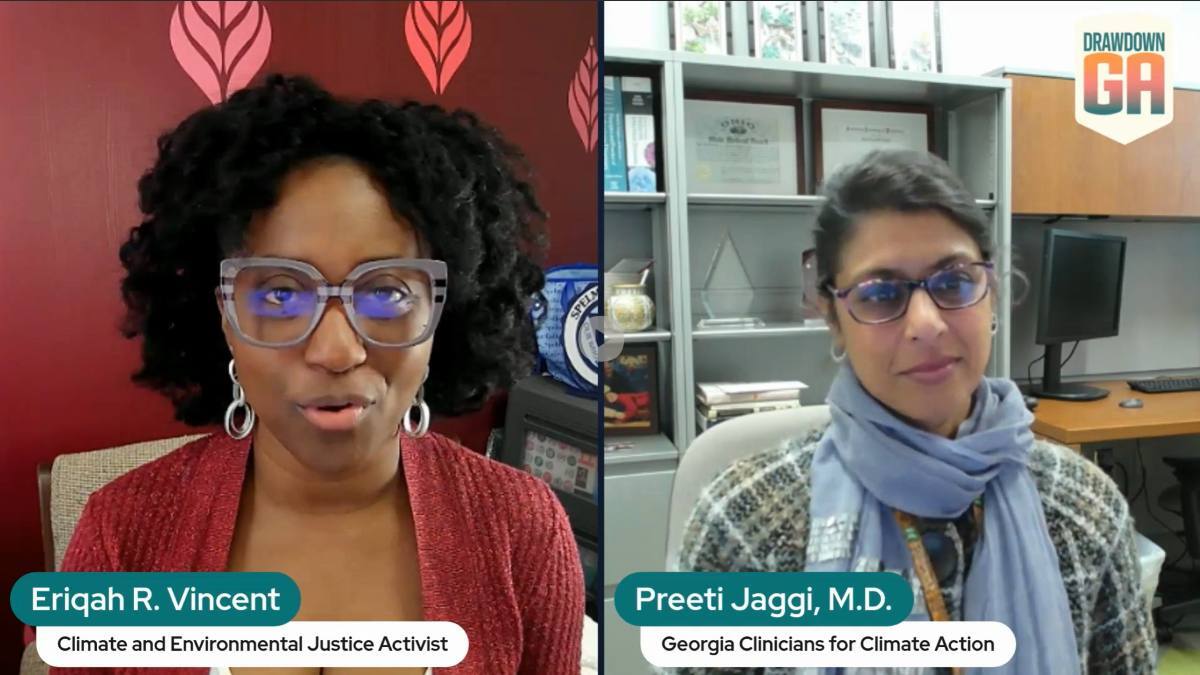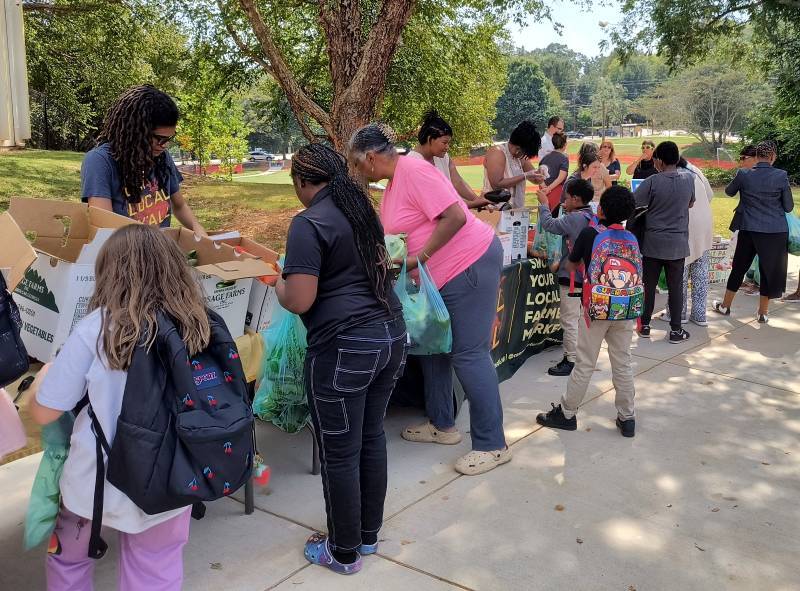How can a more engaged, participatory approach to philanthropy help make a real impact on climate solutions and equity in Georgia?
By embracing its position in the “messy middle” between funders and the many organizations striving to solve for climate, leaders at the Hive Fund for Climate and Gender Justice believe that philanthropy is significantly more impactful when funders adopt a collaborative approach with grantees.
What makes this approach so effective, and how can other funders get involved? Find out in this Georgia Climate Digest video conversation between Eriqah Vincent of Drawdown Georgia and Melanie Allen, co-director of the Hive Fund.
Philanthropy and Climate Interview and Highlights
Highlights:
Melanie’s perspective on philanthropy and climate in her role as an intermediary [5:05 - 7:15]
The importance of centering equity as a consideration in climate work [13:08 - 15:03]
Why Georgia’s progress on climate is so important for the entire country [15:50 - 20:04]
Melanie’s recommendations of climate and equity-focused groups to give to this holiday season [23:06 - 24:35]
A lightly edited transcript follows:
Melanie Allen of the Hive Fund Discusses Philanthropy and Climate Justice
Eriqah Vincent: I'm so glad to be joined today by a sister in the work, somebody I deeply admire, Melanie Allen, co-director of the Hive Fund for Climate and Gender Justice. We're going to have a great conversation today about Philanthropy, which can be an uncomfortable conversation, but I think it's important to the work that we're doing here in Georgia.
I would love for you to start out by telling folks about yourself and about the work that the Hive Fund is doing around climate and gender justice in the Southeast.
Melanie Allen: It is a pleasure to be here and always a pleasure to be in conversation with you. My name is Melanie Allen, and alongside Erin Rogers, I am one of the founding co-directors of the Hive Fund.
One of the things that makes me so excited to do the work that I do is that I get to do it right here at home. I spend a lot of time in Georgia, but I am from North Carolina. I grew up as a movement baby and I’m so appreciative of the strong force of social movements here in the South, from the civil rights movement to seeing so much around immigration and gender justice.
It's a gift, an honor, and a pleasure to get to do this work at the Hive Fund, where we raise money and make grants to folks who are really the stewards of that work. They are pushing us forward, moving towards two twin goals, helping to accelerate an equitable transition to cleaner, more renewable energy.
I came into this work through my own personal health struggles. The work of combating pollution, but also being in conversation with people who have had asthma or other health conditions and beginning to see it as something that is happening on a systems level--something that they collectively can take action to change--is really exciting.
Eriqah: I'm thinking a lot these days about health. We just found out that my daughter has asthma. Even though I have done this work for some time, it's something that has reignited my concern about how our environment is affecting our health.
Philanthropy and Climate Justice in Context
I would love to hear your perspective on the role philanthropy is currently playing in scaling climate solutions and advancing equity. Could we do better, and in what ways?
Melanie: My introduction to philanthropy, like so many people, was small-scale, person-to-person philanthropy. When I was finishing high school, people put their dollars together, and I ended up with a scholarship that helped me buy books for college. I grew up with fish fries and car washes that helped fund things like sending your school on a field trip or scholarships. I think, particularly in the South, we're familiar with folks putting their money together to help individuals or a cause they believe in.
When I think of philanthropy as a sector, it’s important to remember that the core of it is helping people. The word, “philanthropy” comes from a Greek word that means love of humanity.
On the other hand, there is a complicated history of philanthropy. In this country, the wealthy might put “excess” money into philanthropy in order to do some good in the world. But depending on your perspective on economics, you probably don’t see it as excess money. Those are dollars that probably should have gone to wages, or that came from exploitation or extraction in one way or another.
I think this moment is particularly exciting because we're living through a change. I remember when the Hive Fund started in 2019, it was right when reports started coming out about the largest transition of wealth in the history of the United States. For the first time, there were so many women who were going to be in control of their family's wealth. There are so many new opportunities to have different people in positions to make decisions.
The Hive Fund’s Approach to Philanthropy
The Hive Fund is an intermediary - a fund that does not have an endowment, which means that we raise every dollar that we grant. You can think of us as a nonprofit, but our main programmatic work is making grants.
We like to call it the messy middle between the movement and the money. We talk about philanthropy and the good that it can do, but there is also a history of philanthropic practices that have seeded competition.
One of the things that we do at the Hive Fund is funding what we call ecosystems. We're not choosing one group and asking them to solve a complex issue like climate that requires all of our hands on deck. It's important for us to fund an ecosystem, to fund multiple strategies, and to fund collaborative infrastructure that creates opportunities for folks to be in conversation and work together.
Eriqah: I think the Hive Fund model is a very good example of how philanthropy doesn’t have to feel so transactional and stagnant, but really communal and warm. It reminds me of the way communities of color have held fish fries, car washes, and bake sales. I think it's a great example of how philanthropy can work in a better way.
Melanie: Thank you. Our participatory process and deep engagement with our partners is really important. Part of our foundation was in recognizing that organizations that are led by people of color, organizations in the South, and organizations that are led by women of color in particular, have a history of being funded differently, of not being looked at as strategic partners. We try to start from that point.
The Importance of Centering Equity In Climate Philanthropy
Eriqah: What are the other changes foundations can make to realize the vision that you've talked about of this more authentic engagement and communal philanthropy?
Melanie: You know, this feels very Southern, and I am channeling my grandmother, but I talk about it like cake. I think for too long, people of color and people who lead with a justice lens or analysis, have been treated in the climate community as if we are icing on an already baked cake.
There's a strategy, it's already formed, and oh, wouldn't it be nice to have a drizzle of equity to set it off. What we believe at the Hive Fund is that the strategy that is going to help us achieve climate progress at the scale and speed that we need has to have justice at the center.
There's no way to get there by cutting corners around justice. That is why we center our grantee partners as stakeholders and not as an afterthought. We're not the smartest people in the room, which is why we emphasize collaborative relationships.
How do we view the world? How do we think change happens? What's our analysis around what can happen in Georgia? How can that spark action in North or South Carolina, Texas, and Louisiana? How does your work to transform your community go beyond that to be transformational on a national or even global level?
Eriqah: How can the Georgia climate community help both from a philanthropic foundation level and also from an individual level for folks who want to support climate solutions?
Melanie: Thank you so much for this question. It's an honor to fund in Georgia, and we are not in Georgia by accident. We're here because we know how critical this state is to moving climate progress across the country.
Georgia’s Role in Leading on Climate Solutions
Georgia is incredibly important because when we look across the board at states that have received millions of dollars to bring new industries online or to create jobs from the Inflation Reduction Act, Georgia is at the top of the list.
I think there's a lot to learn through what Georgia's most recently been grappling with around the incentives the state created to draw data centers. We've seen this situation has created an increased demand that would allegedly require more gas-fired energy production here. We know that there are alternatives to that, but there's also this specific opportunity in Georgia to explore how we can decrease energy consumption, starting with tried and true basics.
If we were to focus on energy efficiency, then there are tremendous strides that could be made here in Georgia. Georgia has an opportunity to not only shape this new energy economy, but also new labor standards for a growing economy that's going to be the economy of the future. It could be a revolution where all of these things are renegotiated and they're being renegotiated in the South.
If our community comes together and says that we have a vision for a Georgia that is producing clean energy, is not polluting the environment, and is taking care of the surrounding communities, then that is a paradigm shift that will be felt everywhere else across the country. Every Hyundai that's produced here in Georgia will then be the beneficiary of these agreements with communities or these labor agreements. It could set the standard for other manufacturing that has yet to come online.
One of the things that feels most important in Georgia is there are all these people who are doing work on all of these fronts. What does it look like for there to be the space and opportunity for them to come together and take a step back? For us to make sure that equity is baked in, so it's not an afterthought, but it is part of the strategy.
There's also an opportunity for philanthropy to do the same. I think the challenge for us is to do exactly what we want our partners to do, to make time for building a deep, strategic coalition and collaboration that centers equity. To create tables where people can come together outside of this very partisan moment to really think about people and the shared future that we want.
Eriqah: Absolutely. I think the Drawdown Georgia Climate Solutions & Equity Grants, which brought together a number of funders to lay out a pot of funding specifically geared towards projects that emphasize equity first.
It's been really inspiring to see the impact equity has had, and then coupling that with strategies of deep intentional engagement. Of course, the funding is important to make things happen. But also, how are we being responsible about the way that we are engaging with the communities?
Where to Give to Support Climate Solutions in Georgia
Melanie: Yes, and speaking of the work that Drawdown Georgia has done through their equity grants, if there are individuals who are looking to give this season, I think the grant recipients are a great list to look at.
>>Read more about the Climate Solutions & Equity Grant Cohorts from 2023, 2024, and 2025.
I would also direct folks to our website. You can find a state by state list of organizations and link through to an opportunity to give. I would be remiss if I did not name that there is still a lot of opportunity to give in Augusta right now. The community is still reeling from the impacts of Helene.
We know that we're going to have more Helenes. We know that communities need to be ready. I think to be responsive in this moment when communities are still reeling and rebuilding while also thinking about what it looks like to rebuild in a way that's different, that centers community and the new reality that we're all living in.
Eriqah: I'm glad you mentioned that. Can you talk a little bit about the way that the Hive Fund supported folks in Georgia and in the Southeast more broadly?
Melanie: Sure. First of all, we give long-term funding, so we are not set up to be a rapid-response fund. I think one of the great things that we've seen over time is that, because of our funding, communities are better connected. I know that we saw in Houston when the storm hit earlier this year, that some of these networks have been strengthened through long-term support. These communities were able to rely on designated hub homes that have solar and battery power that people know they can go to after a storm.
In North Carolina, we have a relationship with an organization called the North Carolina Inclusive Disaster Recovery Network. We brought them in as a funder because they are convening folks, making sure that, if you don’t speak English, if you are elderly or disabled, or if you live in a community that's hard to get to, your concerns were also addressed.
They've been great at elevating issues and being able to push and change policy, from making sure that folks had extended time and more locations to vote, to making sure that people have in-language resources when they're requesting support from FEMA and other agencies.
What we’ve seen is that philanthropy can do things differently. If we can do it in a COVID moment, if we can do it in a racial reckoning moment, then that means it can be our general practice. That's one of the things that we try to push in philanthropy
Eriqah: That has been my major gripe with philanthropy. The rules are made up. We're making them up, so we can change them in a lot of ways. Just because this is the way that we've done things doesn't mean it always has to be the way we do things.
Celebrating the Diversity of Voices in the Georgia Climate Movement
My last question to you is my favorite question that we ask all our interviewees: What's giving you hope around the climate and environmental justice movement in Georgia? What is keeping you going and what is giving you hope in this moment?
Melanie: That is such a great question. There is so much it feels difficult to narrow down, but I'll say that what gives me hope is the vast array of people who are working on this issue. From elders like Dr. Mildred McClain to Black girl environmentalists who are part of Gen Z. There are all these different approaches and different voices that are all going to be necessary to move us forward.
I'm also so hopeful because we are coming into the moment of being able to invest in innovation in a very specific way. It was the knowledge that federal funding would be coming and what it could look like for community partners to put forth their own vision and build out their own vision for what equitable, accessible, renewable energy would look like.
There's so much energy and opportunity, and I think that that's going to continue to be the case, no matter what's happening at the federal level. Southern people now have the experience of building locally with challenging conditions and they're ready. They're doing it. What gives me hope is that I know that we're going to keep doing it.
Eriqah: Thank you so much for being with us today and for calling us in on your insightful view of the philanthropic community. And Thanks to everyone for joining us for this interview series. Be sure to check out all the other episodes that we have on our YouTube channel!
Subscribe for Future Interviews + Insights on Climate Solutions in Georgia
Subscribe now to the Georgia Climate Digest to receive this and future Georgia Climate Digest video interviews right in your inbox, along with updates about our progress on climate solutions. Click the button below to subscribe.









